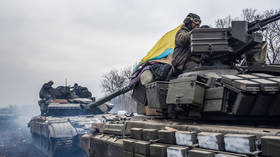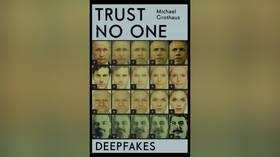Ukraine’s slippery slope

For all the claims that the 2014 Maidan put Ukraine on the road to becoming a democracy, treason charges leveled against the country’s former leader, Petro Poroshenko, show that President Zelensky is increasingly authoritarian.
But what is the point of Zelensky in the first place? It’s a question that many in Ukraine must be wondering about the one-time comedian who now serves in Kiev’s top job. Elected in 2019, Zelensky came to power promising to end the war in Donbass; heal the linguistic, economic and political divisions in the country; tackle corruption; and advance the cause of democracy. Following the divisive rule of his predecessor, Poroshenko, Zelensky appeared to be a great unifier.
Two years on, this is no longer the case. The war in Donbass continues, and Zelensky appears not to have the slightest clue as to how to bring it to a close, refusing any compromise with the breakaway Donetsk and Lugansk People’s Republics (DPR and LPR). The country is as divided as ever. And far from eliminating corruption and advancing democracy, Zelensky is giving the appearance of consolidating his own form of autocratic rule.
Evidence of this came earlier this year, when the Ukrainian government closed down several opposition media outlets, and then ordered the arrest of Viktor Medvedchuk, one of the leaders of the most popular political party in Eastern Ukraine, Opposition Platform – For Life (OPFL). This came soon after the OPFL overtook Zelensky’s Servant of the People party in national opinion polls. Unsurprisingly, many felt that that the charges against Medvedchuk were politically motivated.
Now Zelensky has followed up with an attack on Poroshenko. This happens to correspond with the latter’s European Solidarity party following in OPFL’s steps and overtaking Servant of the People in the polls.Once might be a coincidence. Twice looks more than a little suspicious.
The Ukrainian State Bureau of Investigations (SBU) has informed Poroshenko that he is suspected of high treason and of aiding the activities of terrorist organizations, namely the DPR and LPR. The former president refused to accept a summons for questioning and left the country on Friday, on what his aides say is a pre-planned trip to Turkey and Poland. It remains to be seen when or whether he will return to Ukraine.
The charges against Poroshenko are very similar to those against Medvedchuk and, indeed, both men are accused of working together to undermine Ukrainian state security and line their own pockets. According to the SBI, the case against them involves “the organization of a criminal scheme of coal shipments from the temporarily occupied territories and the facilitation of the terrorist organizations LPR and DPR … acting in collusion with a group of persons, particularly including representatives of Russia’s top leadership.”
Allegedly, Medvedchuk, at Poroshenko’s behest and with the assistance of Russian officials, arranged for the purchase of coal from the DPR and LPR. Thereby, he in effect passed state funds to people whom the Ukrainian government considers terrorists. But, even if true, the charges raise some disturbing questions about Ukrainian politics.
Ukraine needs coal to power factories and keep people warm in winter. The coal traditionally came from Donbass. The complaint seems to be that Poroshenko should have arranged for supplies to come from somewhere else, instead of which he allegedly nixed a deal to get coal from Africa and instead told Medvedchuk to get it from the DPR and LPR.
One can argue whether this was the right thing to do. Government involves compromises: does one allow one’s people to freeze? Or does one purchase coal from one’s enemies? It’s the job of the leader to decide and, given that Poroshenko was president at the time of the alleged deal, that meant it was up to him. It’s hard to see how his actions could count as treason. It was for him to decide on the country’s policy towards the DPR and LPR and on where to buy the nation’s coal.
Since, according to the allegations, Medvedchuk was acting on behalf of the country’s president, it’s difficult to see how his actions could be deemed treasonous either. If he’d been working against the president, that would be one thing. But he was working for him!
This in turn severely undermines the general narrative concerning Ukrainian politics after the 2014 Maidan revolution, which tends to divide political forces into “pro-Russian” (e.g. Medvedchuk and OPLF) and “anti-Russian” (e.g. Poroshenko and European Solidarity). Yet, in fact, the two sides were working hand in hand, supposedly thereby earning money for one another.
This suggests that there are no “pro-Russian” or “anti-Russian” parties, just different groups representing different oligarchic interests, which sometimes compete and sometimes cooperate, depending on what suits them at any given moment. That was true before the 2014 Maidan revolution, and remained true thereafter. In short, little changed.
Zelensky’s use of legal procedures to prosecute his political rivals bears a striking similarity to former president Viktor Yanukovich’s arrest of former prime minister Yulia Timoshenko. That caused an international outcry and became one the primary pieces of evidence used by Yanukovich’s opponents to claim that he was a dictator who had to be removed from office. Yet Zelensky has taken the strategy even further than Yanukovich, targeting not just one, but multiple opponents, and upping the charges to treason. One has to wonder whether Ukraine’s ‘democratic’ revolution has really done anything to advance the cause of democracy.
If the coal deal is true, it smacks of corruption more than treason. The Maidan activists claimed that they overthrew then-President Yanukovich because he was corrupt and was ruling in a dictatorial fashion. But his successor is now said to have been a traitor who engaged in corrupt business deals with opposition politicians and supposed terrorists.
In short, if you believe Zelensky’s case against Poroshenko, you have little choice but to conclude that the Maidan revolution was a huge mistake that replaced a corrupt dictator with a corrupt traitor, creating a situation which now demands a return to dictatorship in the name of honest government and Ukraine’s “European choice.” Whatever way you look at it, it doesn’t look good.
The statements, views and opinions expressed in this column are solely those of the author and do not necessarily represent those of RT.
The statements, views and opinions expressed in this column are solely those of the author and do not necessarily represent those of RT.















